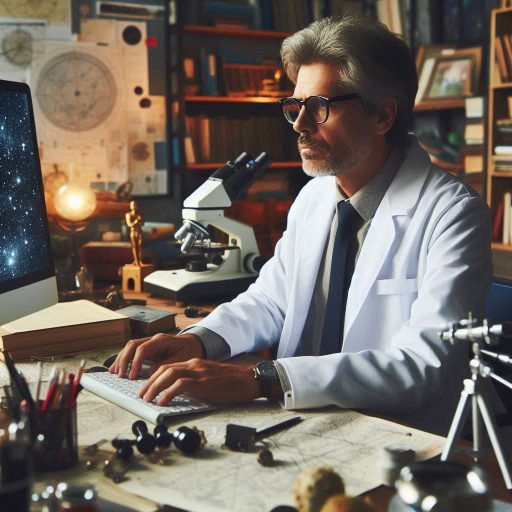Introduction
Essential skills and tools for modern chemists in America
Essential skills and tools are crucial for modern chemists in America, enabling them to succeed in their field.
In the ever-evolving field of chemistry, modern chemists in America must continually adapt and equip themselves with essential skills and tools.
This blog post delves into the critical role these assets play in advancing their careers and the broader scientific landscape.
The aim of the blog post
This blog post aims to highlight the importance of these skills and tools in the chemist’s profession.
The primary aim of this blog post is to underscore the paramount importance of essential skills and tools for chemists operating in the United States.
By doing so, we hope to provide valuable insights to both aspiring and seasoned chemists, shedding light on the keys to success in this dynamic profession.
Chemistry, as a discipline, has seen remarkable advancements over the years, from traditional laboratory experiments to cutting-edge research involving nanotechnology and artificial intelligence.
To stay relevant and make meaningful contributions, chemists must hone their skills and utilize the latest tools available to them.
In the following sections, we will explore these skills and tools in detail, examining how they can enhance a chemist’s capabilities, from laboratory techniques to data analysis and communication.
So, let’s dive into the world of essential skills and tools that modern chemists in America should master!
Read: Key Roles and Responsibilities of a Chemist in the US
Essential Skills for Modern Chemists
In order to thrive in the rapidly evolving field of chemistry, modern chemists must possess a diverse range of skills and tools.
This section will explore the essential skills that are necessary for chemists to succeed in the American landscape.
Strong analytical skills
- Chemists must possess the ability to interpret complex data and draw accurate conclusions.
- Critical thinking and problem-solving abilities are crucial in the field of chemistry.
Chemists must have strong analytical skills to make sense of the complex data they encounter in their work.
Whether it is analyzing chemical structures or deciphering experimental results, the ability to interpret data accurately and draw meaningful conclusions is critical.
Without these analytical skills, chemists would struggle to make progress in their research and development efforts.
Furthermore, chemists must possess critical thinking and problem-solving abilities.
They often encounter unique challenges and obstacles in their work, and it is essential for them to approach these problems with a critical mindset.
By thinking critically, chemists can develop innovative solutions and overcome obstacles efficiently.
Problem-solving skills enable chemists to navigate through experimental difficulties and enhance the quality of their work.
Proficiency in laboratory techniques and safety protocols
- Chemists must have extensive knowledge and experience in handling chemicals and equipment safely.
- They need to be aware of proper waste disposal procedures to ensure the safety of the environment.
Another essential skill for modern chemists is proficiency in laboratory techniques and safety protocols.
Chemists spend a significant amount of time in the laboratory, conducting experiments, synthesizing compounds, and analyzing samples.
It is crucial for chemists to have a deep understanding of how to handle chemicals and equipment safely to prevent accidents and ensure their own safety.
Chemists must also be aware of proper waste disposal procedures. The safe disposal of chemical waste is not only important for the well-being of chemists but also for the environment.
Improper disposal can lead to environmental pollution and create potential health hazards.
Therefore, chemists must stay up-to-date with waste disposal regulations and implement appropriate procedures to protect both themselves and the environment.
Effective communication skills
- Clear written and oral communication is essential for chemists to collaborate with colleagues and stakeholders.
- Chemists also need the ability to present findings and results to a broader audience.
Effective communication is a skill that is essential in any field, and chemistry is no exception.
Chemists need to have clear written and oral communication skills to convey their ideas, collaborate with colleagues, and engage with stakeholders.
Clear communication allows chemists to share their research, discuss results, and exchange ideas effectively, leading to successful collaborations and advancements in the field.
Additionally, chemists must have the ability to present their findings and results to a broader audience.
Chemists must communicate their work clearly, whether presenting at conferences, writing research papers, or delivering presentations, ensuring appreciation of their contributions to the field by others.
Continuous learning and adaptability
- Keeping up-to-date with advancements in the field of chemistry is vital for modern chemists.
- Chemists must be willing to learn and apply new techniques and technologies as they emerge.
Chemistry is a rapidly evolving field, with new techniques, technologies, and discoveries emerging regularly. Therefore, modern chemists need to have a strong commitment to continuous learning and adaptability.
They must actively seek out new knowledge, stay updated with advancements in their field, and be open to incorporating new techniques and technologies into their work.
By keeping up-to-date with the latest developments, chemists can ensure that they are at the forefront of scientific progress.
This not only enhances their own skills and knowledge but also allows them to contribute to advancements in the field of chemistry as a whole.
Furthermore, their willingness to learn and apply new techniques and technologies showcases their adaptability and versatility as chemists.
In general, the essential skills for modern chemists in America encompass strong analytical skills, proficiency in laboratory techniques, and safety protocols.
Effective communication skills, continuous learning, and adaptability
These skills enable chemists to navigate the complexities of their work, collaborate effectively, and contribute to the advancement of the field.
By cultivating these skills, chemists can thrive in the challenging and ever-changing landscape of modern chemistry.
Read: Key Roles and Responsibilities of a Chemist in the US

Tools for Modern Chemists
In addition to their knowledge and skills, modern chemists require a range of essential tools and resources to conduct their work effectively.
These tools span from traditional laboratory equipment to computer software and online databases.
Laboratory equipment and instruments
- Spectrometers, centrifuges, and microscopes are essential tools for chemists in their research.
- Chemists must understand and operate sophisticated analytical instruments to obtain accurate results.
Spectrometers, centrifuges, and microscopes are essential tools for chemists in their research. Chemists must understand and operate sophisticated analytical instruments to obtain accurate results.
Transform Your Career Today
Unlock a personalized career strategy that drives real results. Get tailored advice and a roadmap designed just for you.
Start NowChemists rely on various laboratory equipment and instruments to perform their experiments and analysis. Some of the key tools include spectrometers, centrifuges, and microscopes.
These instruments assist chemists in studying chemical compounds, identifying unknown substances, and analyzing samples.
A comprehensive understanding of these tools is crucial for accurate and reliable results. Chemists must also prioritize safe and proper operation of sophisticated analytical instruments to avoid experimental errors.
Computer software and data analysis tools
- Popular software like ChemDraw and Gaussian is used for chemical analysis and modeling.
- Data visualization and interpretation software are crucial for understanding complex data sets.
Popular software like ChemDraw and Gaussian is used for chemical analysis and modeling. Data visualization and interpretation software are crucial for understanding complex data sets.
In today’s digital age, chemistry has become closely intertwined with computer technology.
Chemists employ software and data analysis tools to streamline their research processes and analyze complex data sets.
Popular software tools such as Cheraw and Gaussian are widely used for chemical analysis and modeling.
These programs enable chemists to draw chemical structures, simulate reactions, and calculate properties.
Additionally, data visualization and interpretation software play a vital role in extracting meaningful insights from experimental results.
Chemists can employ these tools to graphically represent data, identify patterns, and make informed conclusions.
Online databases and resources
1. Online libraries, journals, and databases provide a wealth of research materials and data for chemists
2. Open-access resources are available to chemists, facilitating easy access to valuable information.
Online libraries, journals, and databases provide a wealth of research materials and data for chemists. Open-access resources are available to chemists, facilitating easy access to valuable information.
The internet has revolutionized the way chemists access research materials and gather data.
Online libraries, journals, and databases have streamlined the retrieval of scientific information, making it readily available to chemists around the world.
These resources encompass a vast range of topics and contribute to the dissemination of scientific knowledge.
Furthermore, open-access resources have significantly expanded accessibility by providing free access to research articles and data.
This availability of information fosters collaboration, accelerates scientific progress, and enables chemists to stay updated with the latest advancements in their field.
In essence, modern chemists rely on a variety of tools and resources to enhance their research endeavors.
Laboratory equipment and instruments are essential for conducting experiments, while computer software and data analysis tools enhance efficiency and analysis.
Online databases and resources have revolutionized information access and fostered collaboration among chemists.
By harnessing these tools effectively, chemists can navigate the complexities of their work, drive scientific innovation, and contribute to advancements in the field of chemistry.
Read: Comparing Industrial vs. Academic Chemist Careers in the US
Learn More: How to Publish Research in Soil Science Journals
Find Out More: The Interdisciplinary Nature of Archaeological Work
The Role of Collaboration and Networking
The importance of collaboration in modern chemistry
Collaboration and networking play a pivotal role in the success and growth of modern chemists in America.
It is through collaboration that chemists can exchange knowledge, ideas, and expertise, leading to significant advancements in the field.
Additionally, networking allows chemists to establish connections, access resources, and remain updated on the latest developments.
In this section, we will explore the importance of collaboration and networking in today’s chemistry landscape.
1. Sharing knowledge and ideas with peers and experts
Collaboration facilitates the exchange of information among chemists, enabling them to stay updated on cutting-edge research and emerging technologies.
By sharing their knowledge and ideas, chemists can collectively tackle scientific challenges and find innovative solutions.
Collaboration also fosters a sense of community and teamwork, driving progress in the field.
2. Collaborative research for innovation and breakthroughs
Chemistry is a complex and multidisciplinary field that often requires the expertise of multiple researchers.
Collaborative research projects allow chemists to combine their skills, techniques, and resources, enabling faster progress and breakthrough discoveries.
By pooling together their knowledge and resources, chemists can tackle complex problems and advance the boundaries of scientific understanding.
Collaboration also promotes diversity of thought and encourages interdisciplinary approaches in chemistry.
Utilizing professional networks
1. Participation in scientific conferences and workshops
Attending scientific conferences and workshops provides chemists with a platform to present their work, receive feedback, and engage in discussions with peers.
These events also offer opportunities for networking, allowing chemists to meet experts in their field, establish collaborations, and explore potential research collaborations.
Moreover, conferences and workshops often feature keynote lectures and presentations by renowned chemists, providing valuable insights and inspiration.
2. Joining professional associations and societies
Professional associations and societies serve as invaluable resources for chemists, offering networking opportunities, access to publications, and professional development resources.
These organizations bring together chemists from diverse backgrounds and provide a platform for knowledge sharing, mentorship, and collaboration.
By joining these associations, chemists can expand their professional network, participate in research collaborations, and stay updated with the latest industry trends and advancements.
In the end, collaboration and networking are essential skills and tools for modern chemists in America.
Through collaboration, chemists can leverage the collective expertise and knowledge of their peers, leading to innovative breakthroughs and advancements in the field.
Networking, on the other hand, allows chemists to establish professional connections, access resources, and stay updated on the latest developments.
By actively engaging in collaboration and networking, chemists can enhance their research capabilities, expand their professional network, and contribute to the overall growth and progress of modern chemistry.
Read: How Climate Change Shapes the U.S. Environmental Scientist‘s Role
Conclusion
To wrap up our discussion, let’s recap the essential skills and tools that have been at the forefront for modern chemists in America.
We’ve delved into the significance of analytical expertise, mastery of computational tools, and staying attuned to cutting-edge technology.
It’s imperative to emphasize that the field of chemistry is in a state of perpetual transformation.
This underscores the need for chemists to engage in continuous skill development and remain open to embracing new tools and methodologies.
As the landscape of chemistry evolves, so should our approach to mastering it. Our parting words of encouragement go out to all modern chemists.
As the world of chemistry progresses at an unprecedented pace, the onus is on you to stay informed, adapt, and thrive in this rapidly changing domain.
The future holds remarkable opportunities for those who remain dedicated to growth and excellence in the field of chemistry.




